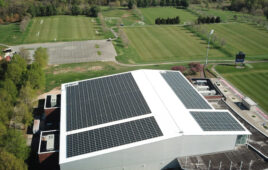The National Association of State Energy Officials and the National Association of Regulatory Utility Commissioners have launched a new partnership to mitigate cybersecurity risks and consequences in solar energy developments. With support from the United States Department of Energy Solar Energy Technologies Office, the project will leverage state, federal and private-sector expertise on cybersecurity, grid and photovoltaics to identify model solar-cybersecurity programs and actions for states to take in partnership with utilities and the solar industry.
The rapid growth and importance of solar energy has elevated the critical need among state-level decision makers to evaluate the potential cybersecurity implications of solar deployment and work with federal and private-sector stakeholders to mitigate those risks. Newer two-way communication technologies and remote grid support are revolutionizing how the grid operates, but also result in a system more exposed to cyber vulnerabilities. NASEO and NARUC seek to proactively address cyber threats in all energy areas, including solar infrastructure.
“As energy systems become more integrated and cyber-connected, their vulnerability to malicious actions grows. Solar technologies are no exception; new tools and a dedicated, multi-stakeholder approach should strengthen solar cybersecurity, and by doing so, enable states to make meaningful progress on climate and resilience goals,” said Commissioner Andrew McAllister of the California Energy Commission and chairman of the NASEO Board of Directors.
“Public utility commissions across the country have focused on the cybersecurity posture of utilities for decades, via state standards, management audits, critical infrastructure planning and other initiatives. An increasing amount of solar energy technologies connected to distribution grids presents new cybersecurity concerns that energy stakeholders across all levels of government and the private sector need to collectively address,” said Commissioner Gladys Brown-Dutrieuille, chair of the Pennsylvania Public Utility Commission and chair of the NARUC Committee on Critical Infrastructure.
The project will use a state-led advisory group and dialogue with solar and cybersecurity experts to advance education, tools and access to technical assistance. The project seeks to develop actionable solar cybersecurity strategies and roadmaps, as well as create stronger public-private partnerships and intra- and interstate cooperation for greater consumer and utility solar cybersecurity.
News item from the National Association of State Energy Officials





Tell Us What You Think!